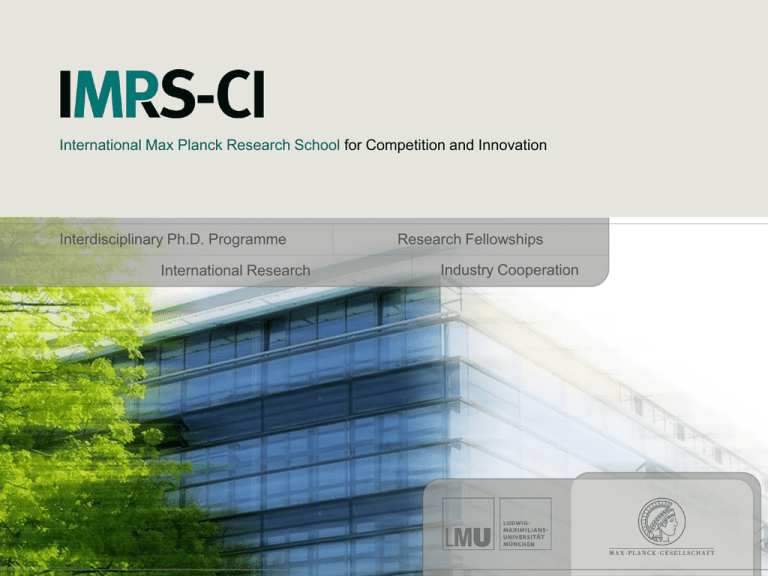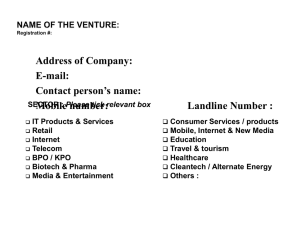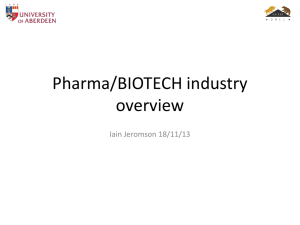The biotechnological sector - Sofia Moratti European University
advertisement

International Max Planck Research School for Competition and Innovation Interdisciplinary Ph.D. Programme International Research Research Fellowships Industry Cooperation International Max Planck Research School for Competition and Innovation Agnieszka Kupzok, LL.M. IP Impact of Brüstle vs. Greenpeace on the biotechnological sector – first indications Max Weber Multidisciplinary Workshop, EUI Florence, October 10th, 2012 Agnieszka Kupzok Impact of “Brüstle“ on the Biotech sector October 10th, 2012 Overview • Context • Impact on the European patent system • Importance of patenting in the biotechnological sector • Impact on the biotechnological sector • Further considerations 3 Agnieszka Kupzok Impact of “Brüstle“ on the Biotech sector October 10th, 2012 Context • Highly politicized topic • September 18, 2012 • Legal Affairs Committee of the European Parliament voted to exclude research funding for hESC from Horizon 2020 Framework Program for Research and Innovation. • The Brüstle judgement of the CJEU was used as a convincing argument. 4 Agnieszka Kupzok Impact of “Brüstle“ on the Biotech sector October 10th, 2012 Impact on the European Patent System (I) • CJEU opined on the wording of the Biotech Directive • EPO adopted the wording of the Biotech Directive in its Implementing Regulations, in 1999. • Due to Article 53 EPC, issues affecting “ordre public” are included in the patentability inquiry of the EPO. • Combined with Rule 28c of the Implementing Regulations, which implements Art. 6(2)(c) of the Biotech Directive, the interpretation of ECJ influences the patentability in all EPO Member States • EPO President 2011: “If the judges rule in favour of a restrictive interpretation of biotech patentability provisions, the EPO will immediately implement it.” 5 Agnieszka Kupzok Impact of “Brüstle“ on the Biotech sector October 10th, 2012 Impact on the European Patent System (II) EPO Member States = EU 27 + 11 States Brüstle v. Greenpeace CJEU’s judgements have an impact on the EU 27. Interpretation of Directive 98/44/EC Art. 6(2)(c) Art. 6(2)(c) included in EPO Implementation Regulations, Rule 28; Together w/Art. 53 (a) EPC 6 Agnieszka Kupzok Impact of “Brüstle“ on the Biotech sector October 10th, 2012 EPO Scenarios for the Future – analytical tool • 4 Scenarios to approach the changing circumstances: – – – – Market Rules – Predominance of Business Who’s World – Predominance of Geopolitics Trees of Knowledge – Predominance of Society Blue Skies – Predominance of Technology 7 Agnieszka Kupzok Impact of “Brüstle“ on the Biotech sector October 10th, 2012 The biotechnological sector • Very innovative, dynamic, and characterized by a large amount of SMEs • European Commission estimated in 2011 that the sector contributed 1,55% of gross value added in the EU. • Biotechnology is the driving force in innovation processes in several industries (pharmaceuticals, agrochemical, energy, environment) • Biotechnology is one of the most research-intensive sectors • Protection of research results, especially due to the high portions of revenue invested in R&D plays an important role. 8 Agnieszka Kupzok Impact of “Brüstle“ on the Biotech sector October 10th, 2012 Patenting in the biotechnological sector • Allows to secure rights in this sector characterized by long development trajectories. • Especially significant, as R&D is characterized by high costs of development and relatively low cost of imitation • Is an essential component, when SMEs are established in the sector as spin-offs. • Provide a contracting basis between “basic” research in the biotech sector and development of specific products and treatments by pharmaceutical companies. 9 Agnieszka Kupzok Impact of “Brüstle“ on the Biotech sector October 10th, 2012 Impact of Brüstle v. Greenpeace on the biotechnological sector • Due to the investment intensive R&D in the biotechnological sector, inability to patent is expected to l lead to lower financing, especially seed financing and venture capital • Lack of financing may function as a barrier to entry. • Lack of proprietary rights may shift the structure of the sector toward “in-house” R&D by big pharmaceutical companies • The guarantee to the investors that patents provide comes at a social cost of the society faced with higher prices charged by the company having exclusivity. Lack of patents in the hESC may lead to cheaper medication. 10 Agnieszka Kupzok Impact of “Brüstle“ on the Biotech sector October 10th, 2012 However… • Patenting is neither a guarantee nor a bar to market success • There are alternatives to patenting in securing benefits from investment: strategic business behavior, lead time. • Territorial nature of patent law limits the bar on hESC to the EU + other EPO Member States. • Territoriality implies that foreign firms will not obtain patents on hESC-related inventions in the EU, either. • Territoriality of patent law also implies that researchers in Europe can apply for patents elsewhere, notably in the United States. • Nature of innovation focuses on finding alternatives: – Induced Pluripotent Stem Cells (iPSCs) (Nobel Prize 2012) – Progenitors 11 Agnieszka Kupzok Impact of “Brüstle“ on the Biotech sector October 10th, 2012 Conclusions • Straightforward securing of investment through patenting is not possible for hESC-based research. • Morality and “ordre public” considerations led to a limitation of rules governing technological progress. • Alternative perspective could be to observe that EU polity is willing to sacrifice future economic gains in order to protect the dignity of human life. • The CJEU judgment affects the biotechnological sector disproportionately strongly, due to the sector’s characteristics and reliance on the patent system. 12 Agnieszka Kupzok Impact of “Brüstle“ on the Biotech sector October 10th, 2012 Thank you for you attention! agnieszka.kupzok@yahoo.com 13 Agnieszka Kupzok Impact of “Brüstle“ on the Biotech sector October 10th, 2012 European Parliament 14 Agnieszka Kupzok Impact of “Brüstle“ on the Biotech sector October 10th, 2012 Bruestle Brüstle v Greenpeace eV (CJEU, 2011) 26. [‘Human embryo’] must be regarded … as designating an autonomous concept of European Union law… 29. [U]nlike Article 6(1) of the Directive, which allows the … Member States a wide discretion in applying the [public ordre/morality] exclusion from patentability … Article 6(2) allows the Member States no discretion with regard to the unpatentability of the processes and uses which it sets out, since [its] purpose is to delimit [Article 6(1)]… 34. The … European Union legislature intended to exclude any possibility of patentability where respect for human dignity could thereby be affected. It follows that the concept of ‘human embryo’ … must be understood in a wide sense. 45. That interpretation is … identical to that adopted by the Enlarged Board of Appeal of the European Patent Office [in Warf]… 15







